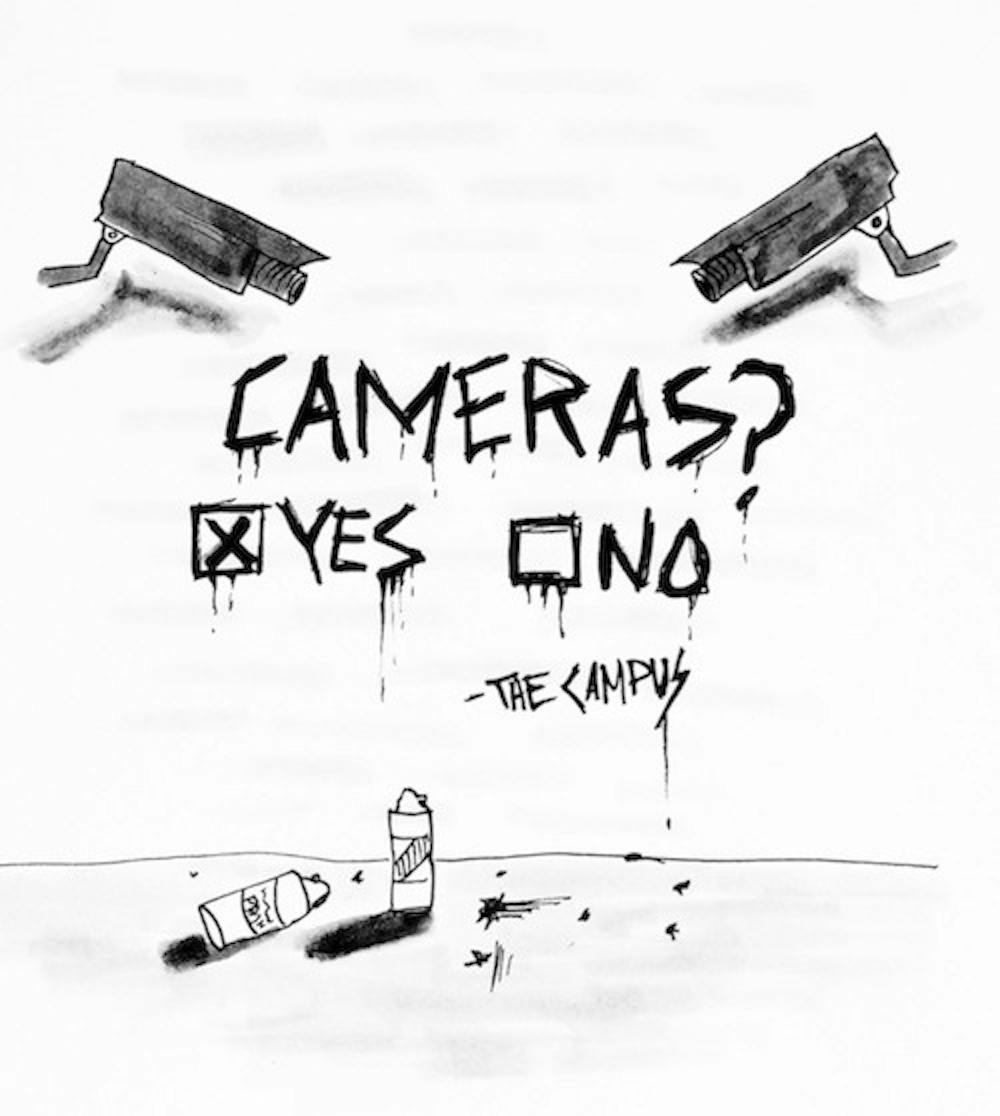It is easy and natural to have a strong emotional reaction to issues of privacy and security. As skeptical, educated adults, we are quick to react whenever we feel our autonomy is being violated — as demonstrated by the incidents of graffiti on our campus commenting on the proposed cameras — or when we feel that the administration is overstepping its bounds. We advocate almost universally for the right to be treated with as much respect and dignity as we would expect any adult to be given. The question of whether to install surveillance cameras is this kind of an issue.
On Monday, Community Council voted down the installation of surveillance cameras in front of Ross and Proctor dining halls. It is a prevalent narrative: we want to be trusted, and surveillance cameras seem to impinge on that trust. We value the uniqueness of Middlebury’s open and safe community and we don’t want to see it lost to constant surveillance. We at the Campus, however, see surveillance cameras as an effort to protect that community and trust, not destroy it.
The first important restriction that makes this the case is that the cameras would be used only as an investigative tool — not for monitoring minor misdemeanors. If a student comes to them with a report of a serious crime such as theft or assault, Public Safety will be able to pinpoint that time and study the recording to try to catch the perpetrator. If they see any minor infractions in the same tape, they would disregard them. No citations should result from installing these cameras. There would have to be a strict guiding document that details who can review footage, how much footage they can see, and which footage it will be. This restriction makes the purpose of the cameras much more a defense of students than an infringement on their autonomy and is at the heart of an important distinction.
As it stands, students are feeling less and less comfortable leaving their things outside the dining halls, with a total of 38 thefts this year. The cameras are here to rectify this situation, not exacerbate it. Middlebury has always valued the relaxed atmosphere we enjoy in the midst of Vermont where we can often leave our possessions unguarded as we go eat lunch. Many of the opponents argue that this is what we are giving up by installing cameras; we at the Campus feel that this is what we are trying to protect. In this case, we need to think of our community members who have had their possessions stolen and see the surveillance cameras as a safeguard for them and for ourselves. The goal is to make the campus feel safer. Surveillance cameras should not be seen as a sign of broken trust between administration and students but as an effort to protect the trust that we all expect from and give to each other.
Many people now have strong anti-policing attitudes, and while this is a relevant and important viewpoint, students must consider the differences of intent between these cameras and other types of policing. There is a large divide between a police state and installing surveillance cameras to protect students’ belongings. Because of the investigative nature of these cameras, and their limitations to reviewing only victim crimes (i.e. theft, sexual assault), even the recent graffiti artists could not be caught on camera. The reason we support these cameras is because we want to see them keep our sense of community intact, not to direct the cameras at members of our community or in anyway impinge on free speech or expression.
Surveillance cameras will allow us to catch the right person with concrete evidence rather than possibly biased speculation and second-hand stories about who might have done it. They will protect students who cannot afford to replace their things and, if used judiciously, can protect the open and trusting culture for which many of us chose to come to Middlebury. In situations like these, it is necessary to look beyond our first emotional reaction and explore the rationale and intention behind the policy. If the cameras are used responsibly in order to protect the dignity and property of our community members, then we at the Campus fully support them.




